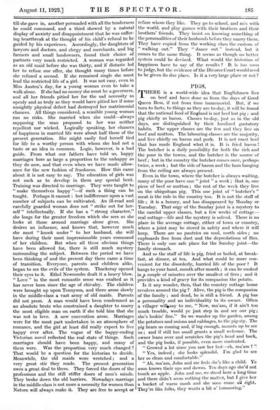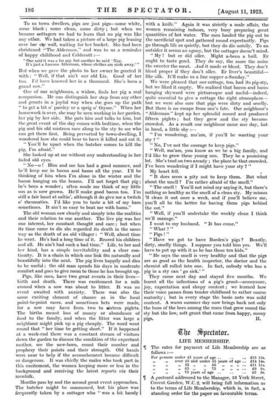PIGS.
Even in the town, where the butcher is always waiting, many of the poor have one " joint " a week ; that is, one piece of beef or mutton ; the rest of the week they live on the ubiquitous pig. This one joint of " butcher's " meat is the rule in the country too. It is not the staff of life ; it is a luxury, and has disappeared by Monday or Tuesday. That orgy of the Sunday joint is a mystery to the careful upper classes, but a few weeki of cottage— real cottage—life and the mystery is solved. There is no place in the average cottage, either of town or country, where a joint may be stored in safety and where it will keep. There are no pantries on cool, north sides ; no cupboards free from dust and the depredations of flies. There is only one safe place for the Sunday joint—the family stomach.
And so the staff of life is pig, fried or boiled, at break- fast, at dinner, at tea. And what could be more con- venient for the disorderly, hurried life of the poor ? It hangs to your hand, month after month ; it can be cooked in a couple of minutes over the smallest of fires ; and it provides a kind of gravy for its companion the potato.
Is it any wonder, then, that the country cottage home revolves around the pig ? Alive, the pig is the companion of the family ; and dead, he is still a friend. A pig has a personality and an individuality to its owner. Often a villager will.say to me, " Now, ma'am, if it ain't too much trouble, would ye just step in and sec our pig ; she's lookin' fine." So we wander up the garden, among the potatoes and onions and cabbages, to the pig-sty. The pig hears us coming and, if big enough, mounts up to see us ; and if still too small grunts a small welcome. The owner leans over and scratches the pig's head and back, and the pig looks, if possible, even more contented. " Growed a lot since you saw her last—eh, ma'am ?
" Yes, indeed ; she looks splendid. I'm glad to see her so clean and comfortable."
" Ah, ma'am, John and me feels she's like a child. Ye soon knows their ups and downs. Ten days ago she'd not touch an apple. John and me, we stood here a long time and there didn't seem nothing the matter, but I give her a bucket of warm mash and she soon come all right. They're like folks, they wants a bit o' humouring." To us town dwellers, pigs are just pigs—some white, some black ; some clean, some dirty ; but when we became cottagers we had to learn that no pig was like any other. We had taken a picture of a large pig leaning over her sty wall, waiting for her bucket. She had been christened "The Alderman," and was to us a reminder of happy childhood and Caldecott :- " One said it was a fat pig, but another he said ' Nay,
It's just a Lunnon Alderman, whose clothes are stole away.'"
But when we gave the photo to her owner he greeted it with : " Well, if that ain't our old Liz. Good of her too. rd have knowed her in a thousand. She's been a grand sow."
One of our neighbours, a widow, finds her pig a real companion. He can distinguish her step from any other and grunts in a joyful way when she goes up the path " to get a bit o' parsley or a sprig o' thyme." When her housework is over, she may be seen working in her garden, her pig by her side. She pats him and talks to him, but the great event of the day comes with bedtime, when the pig and his old mistress race along to the sty to see who can get there first. Being perverted by town-dwelling, I wondered how she could bear to have it killed and eat it.
" You'll be upset when the butcher comes to kill the pig, I'm afraid."
She looked up at me without any understanding in her faded old eyes.
" No—o ! Him and me has had a good summer, and he'll keep me in bacon and hams all the year. I'll be thinking of him when I'm alone in the winter and the bacon hanging on the beams. I'll not forget that pig ; he's been a wonder ; often made me think of my little son as is now grown. He'll make good bacon too. I'm still a fair hand at saltin', although it do give me a twitch o' rheumatics. I'd like you to taste a bit of my ham sometimes. It ain't so easy to beat me with hams."
The old woman saw clearly and simply into the realities and their relation to one another. The live pig was her one interest, her constant thought and care ; but when its time came to die she regarded its death in the same way as the death of an old villager : " Well, about time he went. He's had a long time of it. Reared his children and all. He ain't had such a bad time." Life, to her and her kind, has a simple inevitability and a clear con- tinuity. It is a chain in which one link fits naturally and beautifully into the next. The pig lives happily and dies to be useful ; the old man spends his days in moderate comfort and goes to give room to those he has brought up.
Pigs, like men, have two great events in their lives— birth and death. There was excitement for a mile around when a sow was about to litter. It was an event awaited with anxiety. There was also the same exciting element of chance as in the local point-to-point races, and sometimes bets were made, for a sow may have from two to sixteen piglets. The births meant loss of money or abundance of food to the family, and when the litter was large a neighbour might pick up a pig cheaply. The word went round that " her time be getting short." If it happened at a week-end there was a constant stream of visitors down the garden to discuss the condition of the expectant mother, see the new-born, count their number and prophesy their points and their strength. Old hands were near to help if the accouchement became difficult or dangerous. It was chiefly the males who took part in this excitement, the women keeping more or less in the background and receiving the latest reports via their menfolk.
Months pass by and the second great event approaches. The butcher might be summoned, but his place was frequently taken by a cottager who " was a bit handy 1 with a knife." Again it was strictly a male affair, the women remaining indoors, very busy preparing great quantities of hot water. The men hauled the pig out to the sacrificial spot and gathered round expectantly. Pigs go through life so quietly, but they do die noisily. To an outsider it seems an agony, but the cottager doesn't mind.
" My ! but er did oiler. Might a-been a bull. Er ought to taste good. They do say, the more the noise the sweeter the meat. And it made er bleed. They don't bleed proper if they don't oiler. Er liver's beautiful— like silk. It'll make us a fine supper a-Sunday."
We were pleased that our cottage, too, had its pig-sty, but we liked it empty. We realized that bacon and hams hanging skyward were picturesque and useful—indeed, quite essential to give a cottage the right atmosphere— but we were also sure that pigs were dirty and smelly. But there is no escape from one's fate. Our neighbour's " Alderman " kept up her splendid record and produced fifteen piglets ; but they grew and the sty became crowded. As a result our neighbour came one day, hat in hand, a little shy :- " I'm wondering, ma'am, if you'll be wanting your sty ? "
" No, I've not the courage to keep pigs."
" Well, ma'am, you know as we be a big family, and I'd like to grow these young uns. They be a promising lot. She's trod on two aready ; the place be that crowded. I've been wondering if I might have your sty ? "
My heart fell.
" It does seem a pity not to keep them. But what about the smell ? I'm rather afraid of the smell."
" The smell ! You'll not mind my saying it, but there's nothing so healthy as the smell of a clean sty. My missus '11 clean it out once a week, and if you'll believe me, you'll all be the better for having them pigs behind the cot."
" Well, if you'll undertake the weekly clean I think we'll manage."
I went to my husband. " It has come."
" What ? "
44 pigs !
" Have we got to have Borden's pigs ? Beastly, dirty, smelly things. I suppose you told him yes. We'll have to put up with it as he has those ten kids."
" He says the smell is very healthy and that the pigs are as good as the health inspector, the doctor and the chemist all rolled into one. In fact, nobody who has a pig in a sty can ' go sick.' " They came next day and stayed five months. We learnt all the inflections of a pig's grunt—annoyance, joy, expectation and sleepy content ; we learned how their voice passes from tender childhood to rather coarse maturity ; but in every stage the basic note was mild content. A warm summer day now brings back not only the hum of the bees among the roses that grew round the sty but the low, soft grunt that came from happy, sunny



































 Previous page
Previous page